Transcription
Destined to Failure - DOC STYLE
by Timothy J. Muise
I believe personal stories are the most powerful. It puts a face on the topic or point. When we can feel someone else’s pain or joy the message resonates. It sticks with us. When people watched the movie “Jaws” in the 1970’s it stuck and proof of that is that the oceans were empty that summer. Plenty of folks on the sand but none in the water. That’s the power of a good story. Let me now tell you a little horror story from the set of MCI Norfolk.
My frist cellie here at Norfolk was a man named Scott. Scott was doing about three years for breaking into a trailer to get out of the cold on a winter night. He was drunk, living on the streets and had been kicked out of the homeless shelter due to adverse drunken behavior. Scott was also extremely learning disabled. Three letter words were spelling roadblocks. He was fully functionally illiterate.
In Scott’s police report from his crime it details his alcohol abuse and the fact that he was living in the streets as a result of his addictions. He used any and all drugs he could get his hands on and begged for change to purchase daily vodka. Anyone who read his story could see right away Scott was a low-bottom alcoholic. Well almost anyone.
Scott asked me if I could help him get into the drug program here at Norfolk. The Correctional Recovery Academy is the DOC’s “all-eggs-in-the-basket” drug program. We write to the Director of Treatment and request placement for Scott in the CRA. The director denies Scott’s request on the grounds that he was assessed “low risk” by the training correctional intake staff employed by the DOC. Did they miss something? Basically Scott is a wino who lived on the streets. How can he be low risk?
We write back to the director of treatment and explain the situation again. We let him know about Scott’s history and ask for reconsideration or at least placement in the Men In Recovery program for prisoners who are not CRA eligible. We again hear back from the director and he denies Scott both the CRA and MIR again based on the insane conclusion that Scott is low risk. We have to decide what to do next. It has been my experience that when you try to bring these crazy types of decisions to the attention of the Commissioner of Correction or his underlings they only send the letter to the same person who made the crazy decision. It almost always proves to be a waste of time and energy. What we decide to do is make our case to the Governor. A long shot, but if we are going to waste time lets waste it way up the food chain.
The first letter and attachments are sent to Governor Patrick at his State House office. About two weeks goes by and Scott is called into the office of the caseworker, who knows he is fully functionally illiterate, and she asks him if he wrote the Governor. Scott says he did, with some help, and asks why she asks. She tells him that she was ordered by the deputy here to inform him that he would be starting Men In Recovery the following week. Scott is quite pleased. That afternoon he receives an actual letter from the deputy which fairly clearly blames Scott for his lack of program access, and which has attached a listing of the AA meetings held at Norfolk, a list I must remind you that Scott cannot read! The tone of the letter is so harsh, so angry, that it is clear it is a “how dare you contact the Governor” letter, and not a let’s help Scott obtain treatment effort. Under that premise we decide to send a copy of that letter to the Governor to let him see how angry these “trained correctional professionals” truly are.
This time we send the letter to the governor at his home in Milton, Massachusetts. We offer all due respect to him and his position and make our case as to the insanity of these tactics employed by his staff. In less than a week Scott is called back into the caseworkers office. This time she does not ask if he wrote the governor, but does inform him that he would be starting the CRA program the next day. Now God bless the Governor’s office for its intervention, and I wish this was the happy ending to this story, but it is not.
Scott enters the CRA, a program that involves an enormous amount of reading and writing, neither of which Scott can do. We are worried about his chances of success. Well some good hearted soul in the program assisted Scott with work, probably to his detriment as he needed to do the work himself to reap the needed benefit. He graduates the CRA on time, is awarded his graduation certificate and sent out towards the sunset to drink and drug no more. How he passed all the tests, did all the required homework and displayed to the CRA staff that he lived up to their requirements is a bit of a mystery to me considering his educational level and mental capacity, but none-the-less he was sent on his way with a pat on the back.
The next step in Scott’s DOC re-entry journey was to attend the DOC’s famed (or infamous, depending on how you look at it) “Re-entry Workshop.” A 2008 Urban Institute/DOC study showed that men who were paroled after attending this workshop came back to prison at a 17% higher rate than men who were paroled but DID NOT attend! (now you know why I referred to it as infamous) At any rate this is Scott’s next phase. Now don’t forget he can’t read or write, and that is basically what the program consists of, but again some good hearted souls assist him with the work and he enters the final phase of the workshop. This is the phase where they determine your re-entry plan.
A rocket scientist is not required to figure out that Scott needs intensive residential treatment and special needs educational opportunities. He requires counseling, support group attendance and transitional housing assistance. Disability benefits need to be secured as well as Mass. Rehab arrangements. I’m no social worker or counselor but I do know that this is what Scott must have in place in order to succeed, and so does the DOC, but do you know what their plan was for him? After all he went through to get into and successfully complete the CRA, after making it through the re-entry workshop, and after complying with all the requirements of his captors, the DOC’s re-entry plan for Scott Hurd was to send him to the Lowell Homeless Shelter, on Appleton Street in Lowell, Massachusetts, with $50.00 in his pocket and the clothing on his back! Unbelievable!!
Scott was cut loose from prison with a sure destiny of failure. The DOC has failed Scott, failed the public they are duty charged to protect, but mostly have failed humanity in general because of their almost surely malicious tactical neglects. Men like Scott returning to prison are the DOC’s bread and butter. He is their client base and as far as they are concerned he is a success story for the continuation of their employees’ job security. They fail us while lining their own pockets. The jobs program that is the DOC benefits from the systemic failure.
I have put Scott’s face on this tragedy of systemic failure because it makes it personal, emotionally linked, to a real live human being. It’s not a statistic or a hypothetical example, but is a true non-fiction example of the seriousness of the failure. The $0.70 of each DOC budget dollar that goes to salaries is a true waste of taxpayer dollars. These high paid failures don’t have a clue as to how to properly protect the public, nor do they seem to care. It is outrageous and the public need to demand a complete overhaul of the system. Independent oversight needs to be arranged through a legislatively mandated corrections commission staffed by members unrelated to the DOC, public safety office or formal state government, but which has mandated powers to discipline and act in a timely fashion. The safety of the public demands it.
I am going to pray for Scott. God looks out for his kind. I will try to locate him and if I can I will report further on his case, but for now I just hope that the mean streets are not proving too challenging for him and that the citizens that walk those streets don’t have to pay an unnecessary price due to a desperate act of an unprepared man, destined to failure—DOC style.
Authored by Timothy J. Muise
Long-Termers Representative
Lifes’ Group, Inc.
P.O. Box 43
Norfolk, MA 02056-0043
Other posts by this author
|
2017 jun 24

|
2017 jun 24

|
2017 jun 24

|
2017 jun 24

|
2017 jun 18

|
2017 jun 15

|
More... |

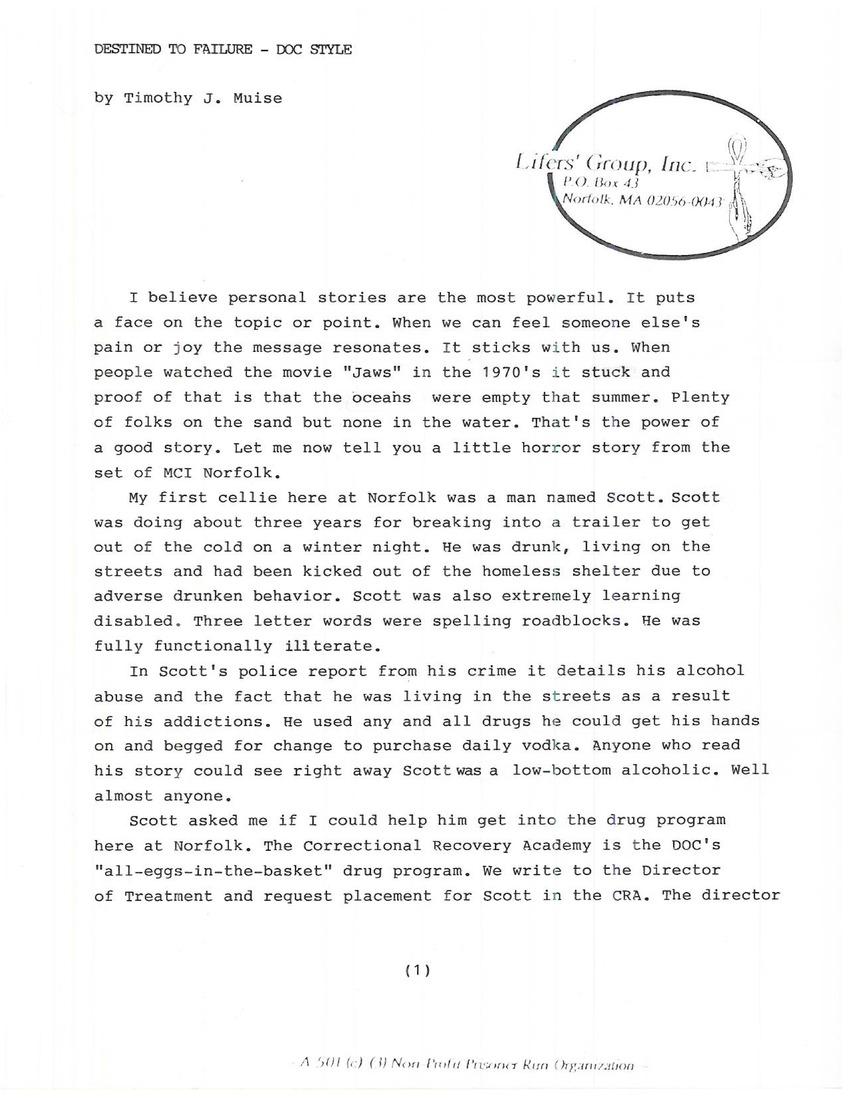
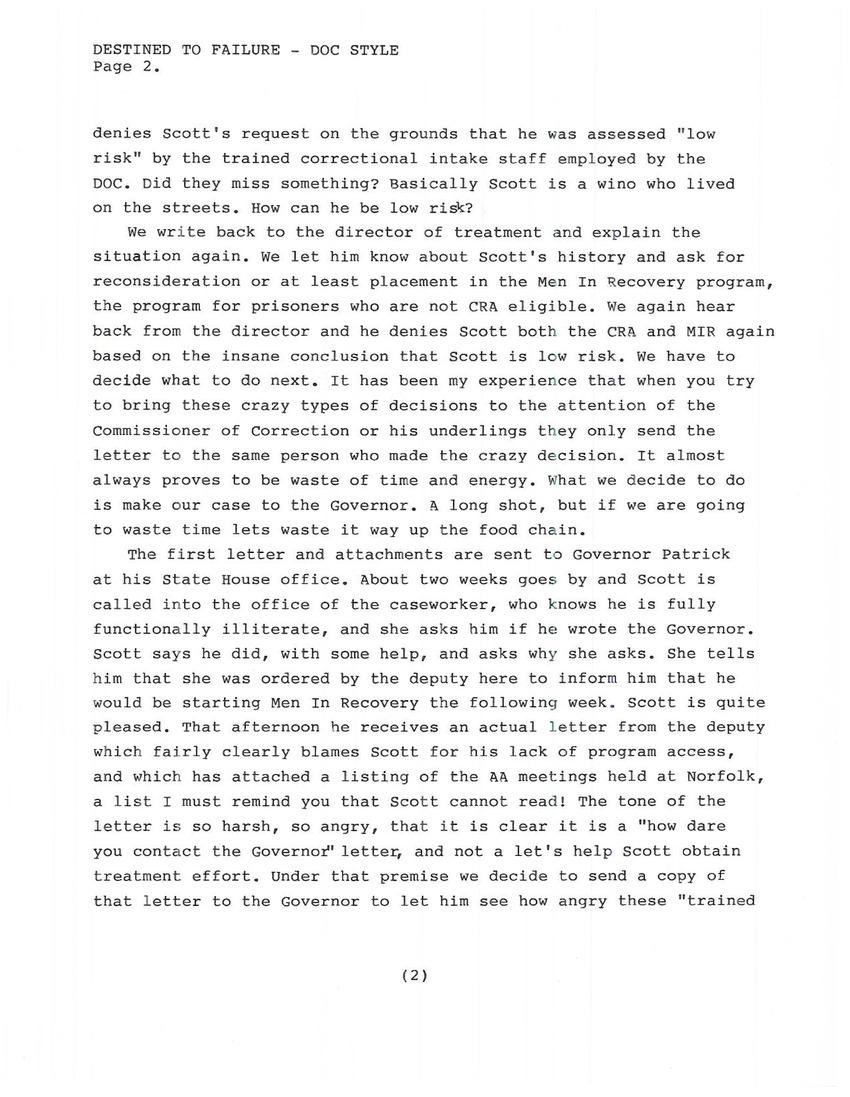
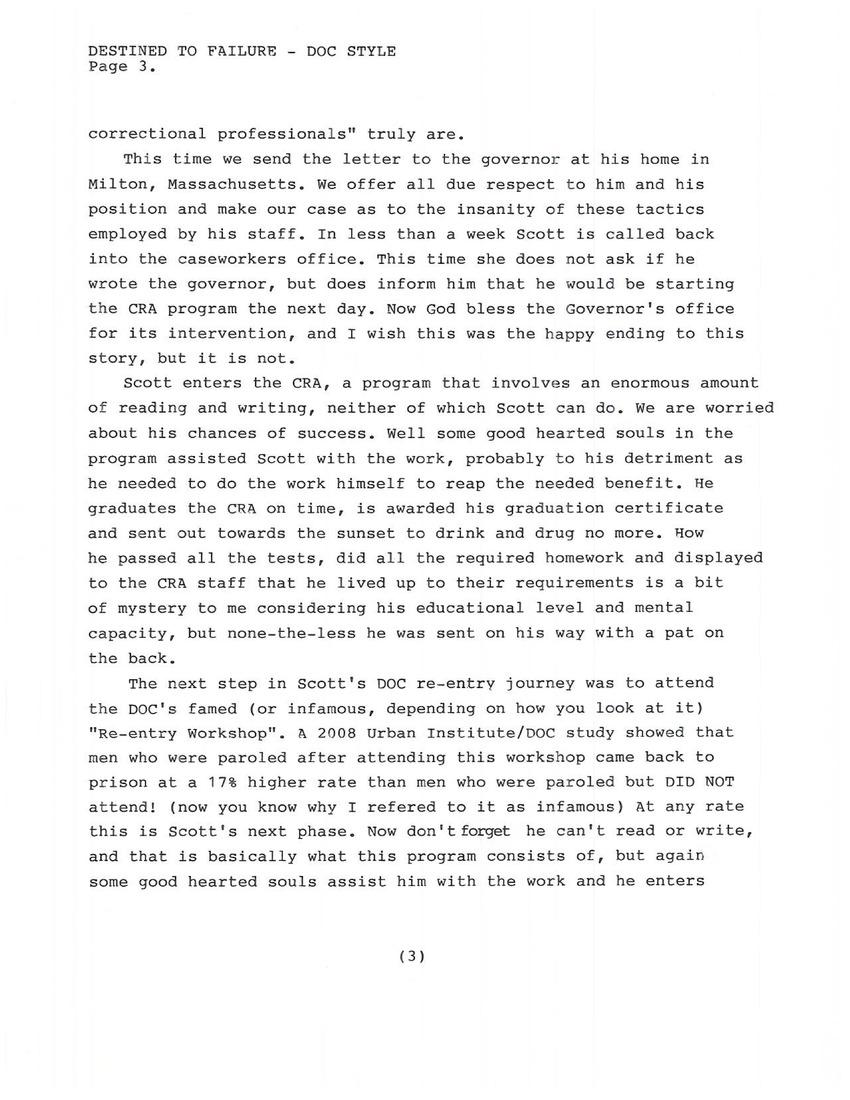
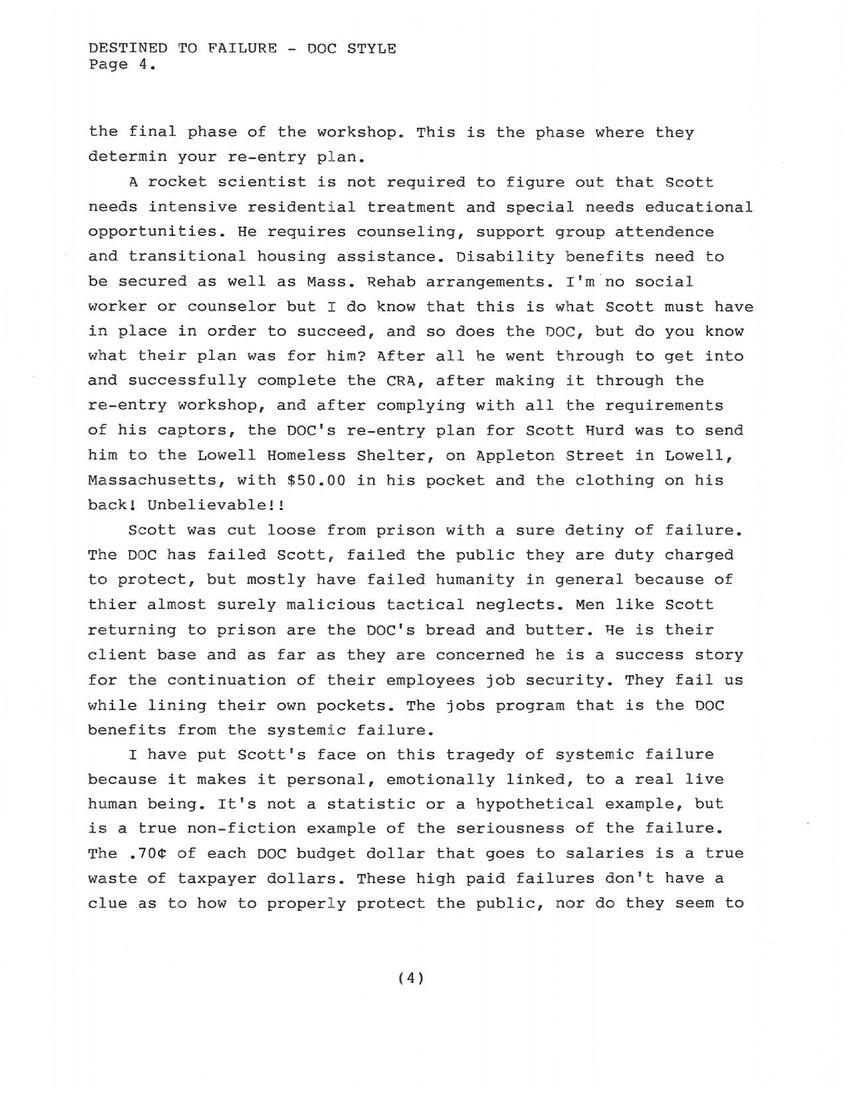
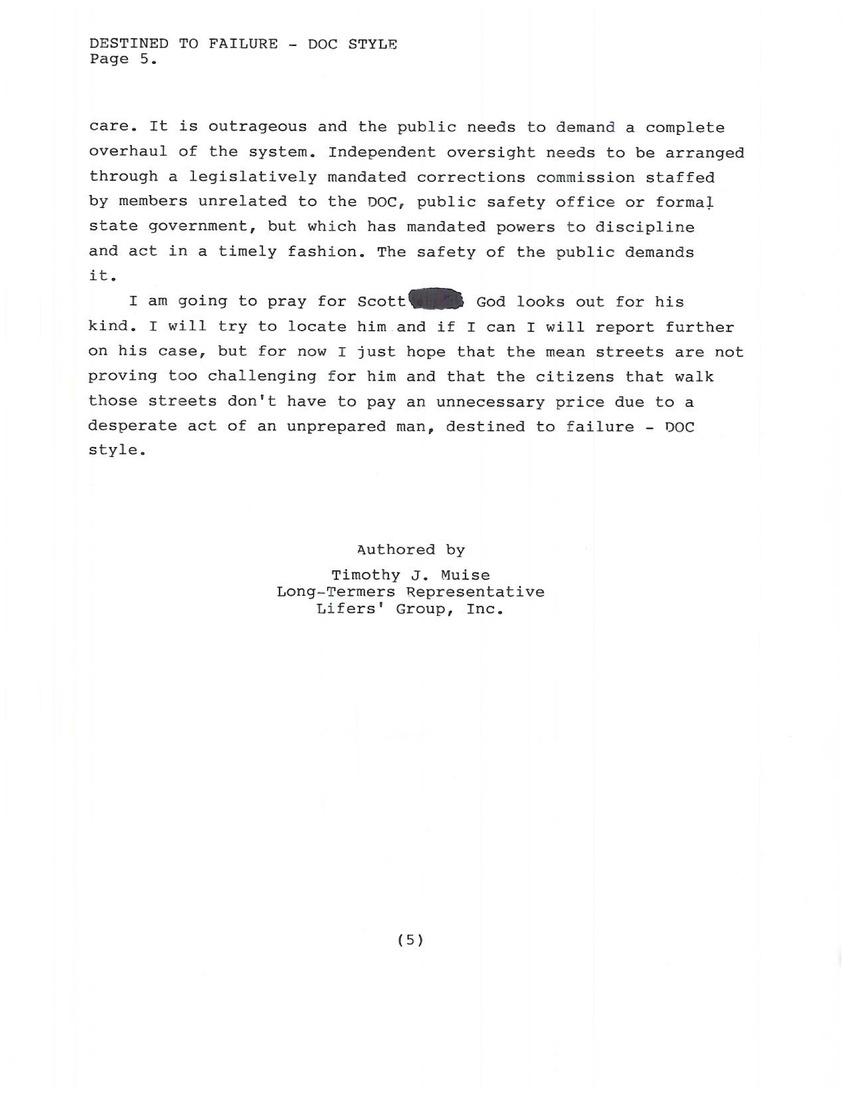

Replies (6)
I also like the idea of the blogs. Nice work.
If the prison system is to work, it has to work for the individual. If someone has a drugs/alcohol problem, it needs to be conquered in a way that the inmate understands or he will forever be a recidivist. What good is it to lock people up with the intent of letting them go at some point and not prepare them for the world outside?
Scott's story is a major story that happens all too often with our institutionalized system. IT happens with hospitals, prisons, schools... Anywhere the government has their hand in. I'm not a libertarian of any sort, but the government hand is too large to help the few and too small to save the masses.
It is very frustrating to see this enormous problem, involving so much callous discrimination and exploitation, but not to know what we can do about it. Since you have a way better understanding and knowledge of this system, do let us know what you think would be the most effective way the public outside of prison to do to tackle these issues.
Thank you very much for sharing this story.